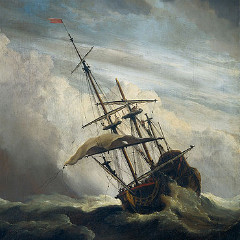
The text says that Abenner was filled with “mingled grief and fury” and spoke “in speech blended of these two passions. . . .” The monk listened patiently but before responding made a request. “If it be thy pleasure, O king, to converse with me, remove thine enemies out of mid court,” he said, “for while these are here, I cannot speak with thee.” Upon hearing, the king demanded the identity of these enemies, and the monk replied, “Anger and Desire.”
Abenner and the monk were treading the same choppy waters in which many of us drown every day, flailing through failed conversations, our words and hopes sunk by tempestuous emotions and attitudes like anger, desire, pettiness, fear, arrogance, and disrespect. I don’t know about you, but I am subject to all of these.
I think the water metaphor is apt. Basil the Great uses it when discussing how emotions affect our communication. In a sermon entitled “Be Attentive to Yourself,” Basil suggests that if we were simply souls we could communicate by thoughts, no interruptions or confusions. Nice idea, but of course we have bodies and “words and names are necessary to make public the things lying in the depth,” as he says. “Accordingly,” and here’s where the maritime metaphor comes back, “our thought takes meaningful voice, as if carried in a ferry by our discourse . . . and if it finds the sea calm and quiet, the discourse comes to anchor in the ears of the students in tranquil harbors untroubled by storms; but if as a kind of rough upsurge the clamor of the hearers blows adversely, it will be dissolved as it is shipwrecked in the air.”
I really like the image of our sending words through the air like cargo in the ships of our voice. It’s a helpful reminder that “environmental conditions” like testy emotions can have a powerful effect on how the words are received in their intended harbors.
How often do our conversations get shipwrecked by these sorts of storms? It happened to me just the other day in a meeting gone awry. If you’ve ever had such an experience you might know how bewildering and confusing and frustrating and embarrassing it can be. I know a thing or two about communication, and I felt utterly helpless. I was sinking fast. No matter what words were said, the tempest battered and sank all meaning and connection. After the meeting, I pulled aside one of the participants in the discussion, and within minutes we resolved the major issues and got the information I needed. But in the heat of the moment, it was all whitecaps and briny mouthfuls.
What to do? Basil’s overall message follows Deuteronomy 15:9, “Be attentive to yourself.” He applies the phrase to the total human experience, but, applied here, note your attitudes and emotions. If they are giving ground to sin, you can take note after you’ve burned bridges and hurt feelings. Or you can take note of them and check their advance before any damage is done. Testy emotions, as the monk told Abenner, are the enemies to meaningful conversation.
“If you were attentive to yourself, you would curb your temper like some disobedient and refractory colt,” says Basil, “striking it with a blow of reason as if by a lash.”
Abenner, in case you were wondering, allowed his anger to flare again and wreaked destruction through his lands. Let his folly be our teacher.











